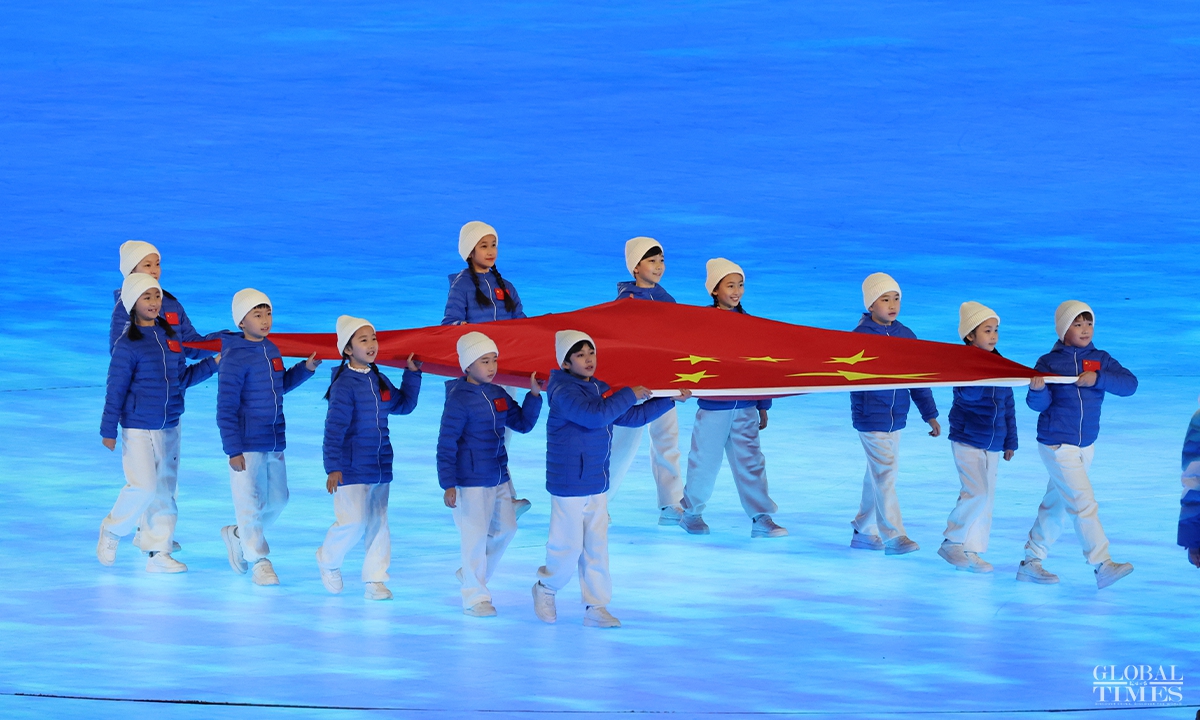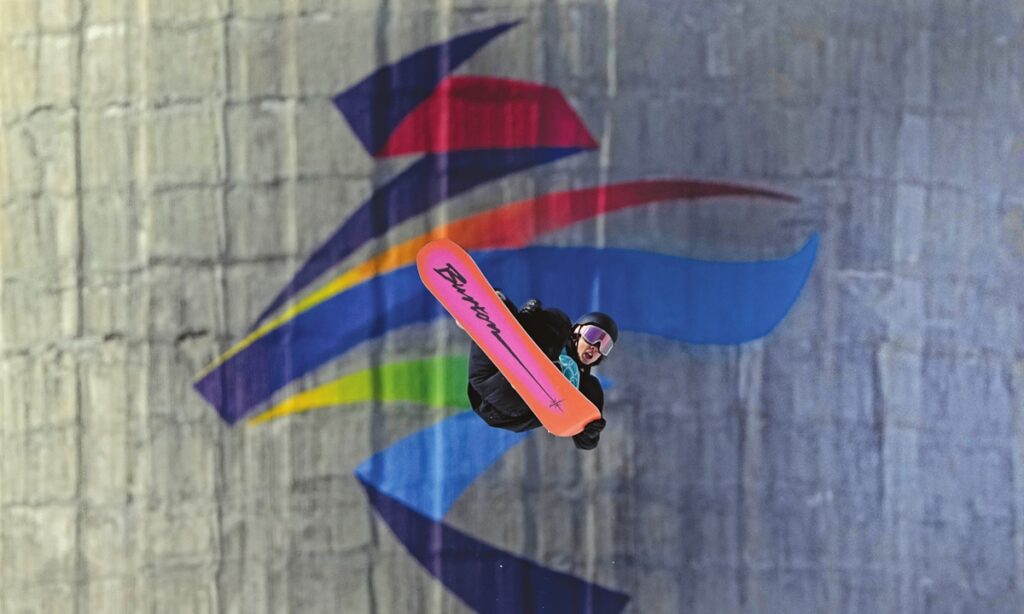Gen-Z athletes show ‘China’s new image for future’
Team China won their sixth gold medal of the Beijing 2022 Winter Olympic Games on Tuesday, as snowboarder Su Yiming, still not quite 18 years old, twisted and turned his way to top spot in the men’s snowboard big air final amid cheers, applause, and tears from the audience on site and watching on TV at home.
With encouraging victories in snow and ice sports, Generation-Z athletes including Su, Gu Ailing and other young members of Team China are topics of hot discussion on Chinese social media. Analysts said the phenomena behind their performances in the Games, including the opening ceremony of the Olympics, showed the new image of the country in the coming future – to make cultures from around the globe a background, and to make the world a platform to present itself.
Breaking the record
Su’s victory on Tuesday allowed the country to break its best record at previous Winter Games with the most golds and the most medals ever. China now ranks the sixth in the Winter Olympic medal table with six golds, four silvers, and two bronzes, breaking the country’s best record set during the 2010 Vancouver Winter Olympics of five golds among a total of 11 medals.
Analysts said that in the remaining days of the Beijing games, China can still compete for at least four gold medals, including the women’s freeski halfpipe where Gu has a great advantage, and the men’s 5000m short-track speed skating relay, aerial skiing and pairs figure skating.
With Tuesday marking the Lantern Festival for Chinese people and only three days before Su’s 18th birthday, the General Administration of Sport congratulated him for becoming China’s youngest Winter Olympic champion, adding that “This is the best coming-of-age gift for himself! This is the best Lantern Festival gift for all Chinese people!”
In Tuesday’s big air final, Su scored 89.5 points in his first round and 93 points in the second, bringing his combined score to 182.5, soaring to the first place as thrilled spectators burst into applause for his incredible success.
As Su received his gold Bing Dwen Dwen mascot after the games, the emotional broadcast commentator said that Su has “told the world with his actions that ‘You guys can never catch up with me!'”
“Like millions of other Chinese youngsters, Su has brought his passion, spirit and vitality to the world,” the commentator said.
At least 16 topics related to Su’s achievement are trending on China’s Twitter-like Sina Weibo as of press time. Netizens are flooding Weibo with emojis of hearts, flowers, crying faces as well as the Chinese flag to congratulate him.
“As an old Chinese saying goes, ‘Heroes always appear when they are still young ever since ancient times,'” commented one netizen. Others jokingly dubbed the big air final as “The one in which Su already claimed the championship before the event even ended.”
Although Chinese people have been encouraged by the victories coming one by one in an Olympics on home turf, Team China has not enjoyed too much home court advantage. Su was on the receiving end of some controversial judging in the freeski slopestyle, which saw him get a silver instead of gold, and Chinese speed skater Ren Ziwei who won gold in the 1,000 meters event, was disqualified in the semi-final of the 1,500 meters short track event.
Unlike some other countries such as South Korea which had obvious home advantages in not only the Olympics but also the World Cup 2002, China is trying to present a fair and clean Olympics to its people, said observers, noting that more and more Chinese spectators and netizens are becoming mature, as most of them encourage athletes who did not win a medal, rather than subjecting them to cyber aggression, as radical voices have been isolated and are more silent.

Beijing 2022 opening ceremony Photo:Li Hao/GT
China’s new image
In his post-qualification interview on Monday, Su said, both to himself and his friend Gu, that as they will both enter the final on Tuesday, he hoped she would perform well, but the most important thing is “to enjoy it and have fun.”
This kind of attitude has shown an entirely new image of not only Chinese athletes but also the people of China, said many observers. There was a stereotype of Chinese athletes such as being hard-working but low profile, and having to withstand a lot of pressure to win medals. Most did not know how to handle interviews with international media except a few superstars like former basketball player Yao Ming.
Mo Yan, Chinese Nobel Prize winner in Literature, said in his WeChat public account that young athletes like Su and Gu dare to challenge the superior difficulties, dare to take the risks for the winning, and they are also able to smoothly communicate with foreign athletes and international media, and able to express their minds in fluent English and Chinese, and all have experience of training or studying overseas. “All of this makes me feel that they have presented the new characteristics of this new era and new generation.”
They are not limited to one specific field, but receive edification from multiple cultures, as they can make the world an arena to present themselves, Mo said.
Chinese generation-Z were born in an age when the country was able to reach out to the rest of the world with confidence. Since many of them enjoy much better education and living standards, they will not envy any other country even though they can travel globally as the lives that they have in China make them sincerely confident and patriotic, said observers.
They dare to take the high risks to prove themselves and they yearn for victory and like to challenge the unchallengeable difficulties, but they can also relax and know how to enjoy the game. They even know how to handle the tough questions from foreign media with high EQ answers, said analysts, stressing that regardless of the hostility that some Westerners, especially those from the US, have against China, if they fail to learn from Chinese generation-Z, or try to demonize or ignore the new image China shows this time, they will definitely lose the competition that they launched against China.
The civilization of the Chinese nation has laid the foundation for them, but they have received various external cultures from the fields of linguistics, arts, sports and even thoughts, said Mo, noting that “this makes them show a brand new appearance of this era. This is what they impressed me the most.”
The opening ceremony of the Beijing Games in 2022 is telling a different story to the one that China told the world in the Beijing 2008 Olympics, said movie director Zhang Yimou, who directed both opening ceremonies. In 2008, China was desperately trying to tell the world “who am I,” but this time we are trying to highlight the idea of “us.”
Analysts said that through watching the 2022 Games opening ceremony, Chinese people also have a new understanding of their civilization, as they notice that China is not just a country with ancient history and traditional culture, but also a great power that is able to lead the way for a shared future for humanity, and able to set an example for the world to recover from the pandemic.
Su Yiming of China competes during the men’s snowboard big air finals of the 2022 Winter Olympics on February 15, 2022, in Beijing.Photo: vcg




